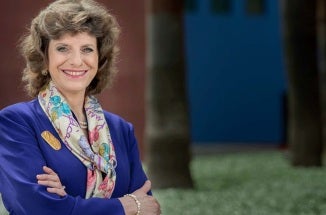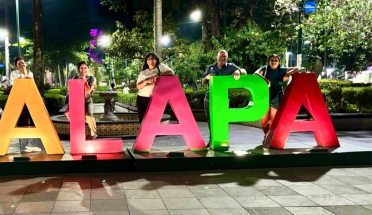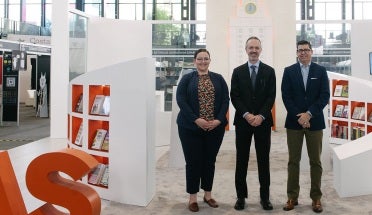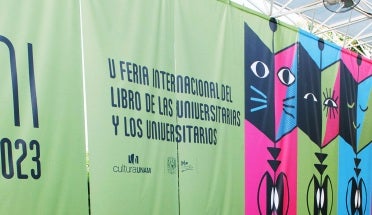
Mother, Professor, Economist, Diplomat: Longhorn Alumna María de Lourdes Dieck-Assad
- Apr 25, 2022
- Global Alumni Relations
- by Alex Briseño
Long before María de Lourdes Dieck-Assad served as Mexico’s ambassador to Belgium and Luxembourg, co-authored a book on economics with a Nobel Prize recipient and cemented her reputation as a global economist, she departed from Mexico to relocate to Austin alongside her husband. The two had the same goal in mind: to pursue a Ph.D. in economics at The University of Texas at Austin.
“In life, we go through difficult times, but what is important is that you have been privileged to receive an education at the highest level, so you can get up if you fall." —María de Lourdes Dieck-Assad
With a bachelor’s degree from Tecnológico de Monterrey and a master’s from Vanderbilt University, Dr. Dieck-Assad was fully aware of the passion she felt for economics. Dating back to her childhood in Monterrey, Mexico, where she attended an all-girls Catholic school through graduation, Dieck-Assad vividly remembers falling in love with economics and setting a life goal to use it as a vehicle to benefit the greater good.
“When I started studying economics, I saw that I really can do a lot with these tools to help my country, its citizens or even the world,” said Dieck-Assad.
This realization resulted in an accomplished career that includes a slew of accolades: receiving the Grand Cross of the Order of the Crown of Belgium for her diplomatic work as an ambassador and chief of the Mexican Mission to the European Union; becoming the dean emeritus of the Business School of Tecnológico de Monterrey; and serving on the Advisory Council for the Governor of the State of Nuevo León in Mexico, to name a few.
Before Dieck-Assad went on to pave her own path, though, she arrived at UT Austin, where it wasn’t just her talent as a skilled economist but also an affinity for teaching that shined through.
Discovering a Love for Teaching
Besides the competitive university environment, which she loved, another cherished element of Dieck-Assad’s UT Austin experience announced itself when she landed a teaching assistantship for a 500-person undergraduate economics class.
Unlike the 10 other teaching assistants, who were each responsible for several dozen first-year students, Dieck-Assad was assigned to teach just one student who was visually impaired.
“The professor knew me because he was my teacher in an econometrics class, so he assigned me to be the TA for this student,” remembered Dieck-Assad. “He said, ‘You are going to dedicate yourself to this student.’ ”
She went over the lesson with this student after every class and found herself digesting graphs and concepts in a new way in order to verbally describe the material.
“I felt so good when I saw that he was understanding the material; it really showed me a love for teaching,” said Dieck-Assad.
With their first year in Austin behind them, Dieck-Assad and her husband, Pedro Quintanilla, welcomed their first baby. The two arranged opposite course schedules for the following academic year, allowing them to trade off between attending class and taking care of their baby for an entire semester.
After completing comprehensive exams a few years later, the two had a second daughter. Then, with a 4-year-old and a newborn in tow, Quintanilla accepted an offer from the Inter-American Development Bank, and the family moved to Washington, D.C.
Making a Difference
During her first year in Washington, D.C., Dieck-Assad defended her dissertation before receiving two opportunities that would serve as a launchpad for her career. The first was a full-time teaching position at Trinity University; the second was a part-time consultant job at the World Bank.
With the arrival of a third child—their first and only son—Dieck-Assad found herself juggling two jobs all while raising three kids. And in three years’ time, she climbed the ladder and became the chair of the Economics Department at Trinity.
Shortly after achieving tenure at Trinity, Dieck-Assad and her family opted to return to Mexico, where she started an illustrious stint at Tecnológico de Monterrey. After this homecoming, she went on to serve as professor of economics, Ph.D. director and, later on, as the dean of the Graduate School of Business from 2011 until 2016, when she was named dean emeritus.
Aside from "her kids"—meaning both her children and her students—Dieck-Assad says it’s her collaboration with Nobel Prize winner Paul A. Samuelson on the books “Macroeconomía con aplicaciones a México” and “Macroeconomía con aplicaciones a Latinoamérica” that she is proudest of.
“That’s something that is a highlight for me because of the impact in the teaching of macroeconomics to Mexican students,” said Dieck-Assad. “As a teacher, we always had to come up with our own examples because the books would never have examples of Mexico or even of emerging markets.”
Diplomatic Work
With more than a decade of experience under her belt, Dieck-Assad received an offer from the Mexican government to work for the Ministry of the Economy.
Her husband continued his professional career and took care of the kids in Monterrey while Dieck-Assad traveled to Mexico City every Monday and returned by the weekend. Unsurprisingly, this proved to be a decision that cultivated another branch of her esteemed career.
In Mexico’s federal government, Dieck-Assad went on to serve as the chief advisor to the secretary of the economy and the Department of State, later becoming the Department of State’s undersecretary of economic affairs and international cooperation.
It was during this time that Dieck-Assad was asked to assist the Mexican ambassador to Belgium, who was struggling to negotiate with the undersecretary for Europe.
“When you come from academics, you have a free mind,” said Dieck-Assad. “You work with everybody. I don’t care about politics. I care to have the work done for my country.”
By the time that work was done, Dieck-Assad was presented the opportunity to become the ambassador to Belgium. After initially expressing hesitancy due to the distance between Brussels and her family in Monterrey, she accepted the post and was eventually appointed by President Vicente Fox as ambassador of Mexico to Belgium and Luxembourg, with her family’s full support.
Dieck-Assad didn’t take for granted the chance to promote her country on a global scale, a moment in her career that she still reflects on with great pride.
“Sometimes the people that work in the embassy would say, ‘You don’t seem to rest very much.’ And I’d say, ‘Well, I’m not here to rest. I am here to do something. If I am making the sacrifice to be away from my family, I’m going to make sure that this is worth it,’ ” said Dieck-Assad.
She added, “I promoted Mexico’s culture with beautiful expositions of Mexican art and Mexico’s economy with many business interactions. Different European universities invited me all the time to give talks, so I was able to get some scholarship funds for Mexicans to go to Europe and for Europeans to come to Mexico.”
With her diplomatic and academic career as a background, Dieck-Assad also joined the University of Miami as the inaugural vice president for hemispheric and global affairs, where she forged collaborative initiatives with Latin American and Caribbean institutions.
Dieck-Assad is currently enjoying the flexibility of working as an independent consultant in economics, education and global affairs. In addition to serving on the Advisory Council for the Governor of the State of Nuevo León, she also was named to the drafting group of the new constitution of the state.
As a highly accomplished Texas Ex, Dieck-Assad left a message for the Class of 2022: With a great education comes great responsibility.
“In life, we go through difficult times, but what is important is that you have been privileged to receive an education at the highest level, so you can get up if you fall,” said Dieck-Assad. “You can go around barriers in your life. Do not give up, and always remember: If you have the privilege of having such a wonderful education, you have a responsibility, too.”



